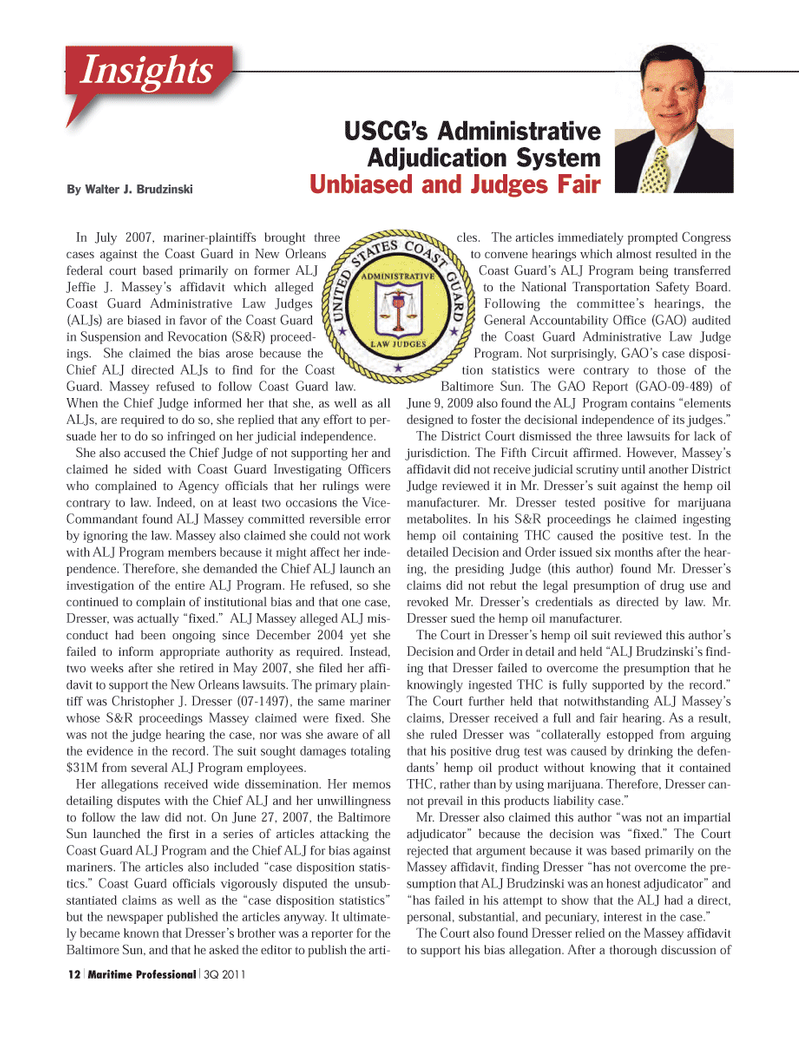
Page 12: of Maritime Logistics Professional Magazine (Q3 2011)
Maritime Security / Maritime Training & Education
Read this page in Pdf, Flash or Html5 edition of Q3 2011 Maritime Logistics Professional Magazine
12 Maritime Professional 3Q 2011In July 2007, mariner-plaintiffs brought three cases against the Coast Guard in New Orleans federal court based primarily on former ALJ Jeffie J. Massey?s affidavit which alleged Coast Guard Administrative Law Judges (ALJs) are biased in favor of the Coast Guard in Suspension and Revocation (S&R) proceed- ings. She claimed the bias arose because theChief ALJ directed ALJs to find for the Coast Guard. Massey refused to follow Coast Guard law. When the Chief Judge informed her that she, as well as allALJs, are required to do so, she replied that any effort to per- suade her to do so infringed on her judicial independence. She also accused the Chief Judge of not supporting her andclaimed he sided with Coast Guard Investigating Officers who complained to Agency officials that her rulings were contrary to law. Indeed, on at least two occasions the Vice- Commandant found ALJ Massey committed reversible error by ignoring the law. Massey also claimed she could not work with ALJ Program members because it might affect her inde- pendence. Therefore, she demanded the Chief ALJ launch an investigation of the entire ALJ Program. He refused, so she continued to complain of institutional bias and that one case,Dresser, was actually ?fixed.? ALJ Massey alleged ALJ mis- conduct had been ongoing since December 2004 yet shefailed to inform appropriate authority as required. Instead, two weeks after she retired in May 2007, she filed her affi- davit to support the New Orleans lawsuits. The primary plain- tiff was Christopher J. Dresser (07-1497), the same mariner whose S&R proceedings Massey claimed were fixed. She was not the judge hearing the case, nor was she aware of all the evidence in the record. The suit sought damages totaling $31M from several ALJ Program employees. Her allegations received wide dissemination. Her memos detailing disputes with the Chief ALJ and her unwillingness to follow the law did not. On June 27, 2007, the Baltimore Sun launched the first in a series of articles attacking the Coast Guard ALJ Program and the Chief ALJ for bias against mariners. The articles also included ?case disposition statis- tics.? Coast Guard officials vigorously disputed the unsub- stantiated claims as well as the ?case disposition statistics?but the newspaper published the articles anyway. It ultimate- ly became known that Dresser?s brother was a reporter for the Baltimore Sun, and that he asked the editor to publish the arti- cles. The articles immediately prompted Congress to convene hearings which almost resulted in the Coast Guard?s ALJ Program being transferred to the National Transportation Safety Board. Following the committee?s hearings, the General Accountability Office (GAO) audited the Coast Guard Administrative Law Judge Program. Not surprisingly, GAO?s case disposi- tion statistics were contrary to those of theBaltimore Sun. The GAO Report (GAO-09-489) of June 9, 2009 also found the ALJ Program contains ?elements designed to foster the decisional independence of its judges.? The District Court dismissed the three lawsuits for lack of jurisdiction. The Fifth Circuit affirmed. However, Massey?s affidavit did not receive judicial scrutiny until another District Judge reviewed it in Mr. Dresser?s suit against the hemp oil manufacturer. Mr. Dresser tested positive for marijuana metabolites. In his S&R proceedings he claimed ingestinghemp oil containing THC caused the positive test. In the detailed Decision and Order issued six months after the hear-ing, the presiding Judge (this author) found Mr. Dresser?s claims did not rebut the legal presumption of drug use and revoked Mr. Dresser?s credentials as directed by law. Mr. Dresser sued the hemp oil manufacturer. The Court in Dresser?s hemp oil suit reviewed this author?s Decision and Order in detail and held ?ALJ Brudzinski?s find- ing that Dresser failed to overcome the presumption that he knowingly ingested THC is fully supported by the record.? The Court further held that notwithstanding ALJ Massey?s claims, Dresser received a full and fair hearing. As a result, she ruled Dresser was ?collaterally estopped from arguing that his positive drug test was caused by drinking the defen- dants? hemp oil product without knowing that it contained THC, rather than by using marijuana. Therefore, Dresser can- not prevail in this products liability case.? Mr. Dresser also claimed this author ?was not an impartial adjudicator? because the decision was ?fixed.? The Court rejected that argument because it was based primarily on the Massey affidavit, finding Dresser ?has not overcome the pre- sumption that ALJ Brudzinski was an honest adjudicator? and ?has failed in his attempt to show that the ALJ had a direct, personal, substantial, and pecuniary, interest in the case.? The Court also found Dresser relied on the Massey affidavit to support his bias allegation. After a thorough discussion of USCG?s Administrative Adjudication SystemUnbiased and Judges FairBy Walter J. Brudzinski InsightsMP #3 (1-17):MP Layouts 8/19/2011 10:49 AM Page 12

 11
11

 13
13
